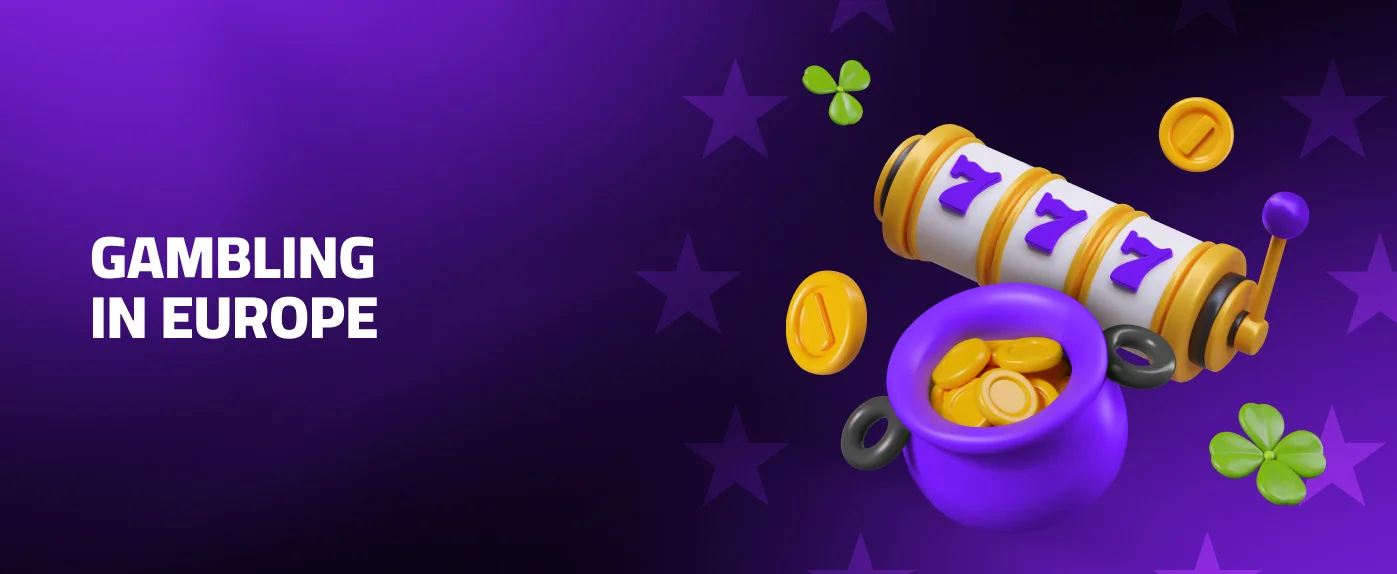
Gambling in Europe: Laws, Licensing, and Compliance Explained
Europe is one of the most diverse and tightly regulated gambling markets in the world. For both online gaming operators and regular players, staying informed isn’t just helpful but rather essential. The regulatory environment varies widely from country to country, affecting everything from licensing to taxation. Whether you are looking to run your casino business legally or just want to avoid trouble as a user, knowing the rules can make all the difference. That is why understanding how gambling in Europe is regulated is key — covering compliance, age limits, iGaming regulations, and more.
Strong regulation is what sets the European gambling market apart from many others. These rules don’t just settle the question “Is gambling legal in Europe?”, but they also promote fair play standards, protect user funds, and reduce the risk of abuse. Licensing acts as a filter, keeping unreliable platforms out of the market, while ongoing checks ensure operators stay alert and prioritise user protection. Without strong regulation, the industry would face rising fraud risks, poor accountability, and serious harm to both consumers and legal businesses.
EU Influence on iGaming Regulation
The European Union doesn’t directly control gambling laws and regulations within its member states, but it plays a significant role in shaping how those laws are applied. This influence is especially clear when it comes to data privacy and financial safety standards that affect the entire online gambling market in Europe.
One of the main rules affecting this market in Europe is the General Data Protection Regulation (GDPR). It applies to any platform that collects or manages personal data from EU players. The law tells operators how to handle that data — from collection and storage to how it gets used. Its goal is to keep user privacy protected at all times, including within iGaming services.
Another key framework is the Anti-Money Laundering Directive (AMLD). It has been updated several times to close loopholes and reduce financial crime risks. Under AMLD, gambling operators must verify users, report anything suspicious, and keep an eye on odd account activity. These steps make it significantly harder for criminals to misuse gambling platforms.
The EU Court of Justice has also played a key role in setting legal examples, especially when disputes involve access to the gambling market or national limits. Its decisions shape what each country is allowed to regulate and help bring more consistency to the rules across Europe.
While there is no single EU-wide law specific to gambling, GDPR, AMLD, and past legal decisions have created shared benchmarks. These frameworks help shape a more unified regulatory approach, even across diverse national systems. As a result, operators gain clearer direction, and cross-border operations become easier to manage.
Overview of Top Gambling Countries in Europe
European countries approach online gambling differently, from licensing structures to taxation and player protection. While the EU sets broad data and compliance standards, individual nations apply their own rules. Below is a summary of the top regulated markets across Europe, followed by a closer look at each one.
| Country | Market Overview | Regulatory Body |
|---|---|---|
| Germany | Regulated under the Germany State Treaty on Gambling; licensing standards apply to sports betting and slots. | Gemeinsame Glücksspielbehörde der Länder (GGL) |
| France | Online gambling allowed for sports betting, horse racing, and poker; casino games remain restricted. | Autorité Nationale des Jeux (ANJ) |
| Italy | Fully regulated with licensing through ADM; strong focus on player protection and responsible gaming. | Agenzia delle Dogane e dei Monopoli (ADM) |
| Spain | All online gambling activities require licensing; active enforcement of responsible gaming. | Dirección General de Ordenación del Juego (DGOJ) |
| Malta | Hub for many B2B and B2C operators; MGA sets high compliance and technical standards. | Malta Gaming Authority (MGA) |
| Netherlands | Regulated since 2021; licenses granted through strict KSA procedures. | Kansspelautoriteit (KSA) |
| Sweden | Competitive and licensed market with tight restrictions on bonuses and marketing. | Spelinspektionen |
| Denmark | Open and transparent market with well-defined rules for all iGaming sectors. | Spillemyndigheden |
| United Kingdom | Mature and fully regulated market; all operators must be licensed for each vertical. | UK Gambling Commission |
Germany
Germany operates under the State Treaty on Gambling (GlüNeuRStV), enacted in July 2021. Regulation is handled by the GGL (Gemeinsame Glücksspielbehörde der Länder). The treaty legalised online sports betting, virtual slot machines, and poker across all federal states.
Operators must be licensed and follow strict player protection rules, including deposit limits, reality checks, and a centralised player ban system. Online casino table games are subject to individual state regulation, with some states limiting or banning them entirely.
Taxes are applied at 5.3% of turnover for slots and poker, while casino brands must maintain transparency and conduct regular audits to keep their licences.
France
In France, online gambling is legal only for specific verticals: sports betting, horse racing, and poker. Online casinos remain prohibited. Regulation is handled by the Autorité Nationale des Jeux (ANJ), which replaced ARJEL in 2020.
Licensed operators must implement strong AML and player protection policies, including deposit limits and responsible gambling messaging. The ANJ also restricts bonuses and advertising practices to protect vulnerable users.
Despite market limitations, France maintains high regulatory standards and regularly issues penalties for non-compliance. Taxes are calculated on stakes and vary depending on the type of game.
Italy
Italy’s online gambling market is fully regulated, with oversight by the Agenzia delle Dogane e dei Monopoli (ADM). Licences are required for all gambling verticals, including sports betting, casino games, poker, and bingo.
Operators are obliged to meet rigorous standards for transparency, AML, and data protection. Safer gambling measures include deposit limits, self-exclusion options, and mandatory warnings during gameplay.
Advertising is heavily restricted under the “Dignity Decree” (Decreto Dignità), and tax is calculated on gross gaming revenue. The ADM also conducts regular audits to ensure compliance.
Spain
Regulated at the national level, Spain’s gambling sector is overseen by the Dirección General de Ordenación del Juego (DGOJ). The country issues licences across most verticals, including sports gambling, poker, and casino games.
All operators must comply with data security, AML regulations, and responsible play protocols. Recent updates have introduced tighter advertising restrictions and improved player verification systems.
Spain’s market is known for its stability and well-structured regulatory framework, with taxation based on net gaming revenue.
Malta
Malta is home to one of the most influential regulatory bodies in Europe, the Malta Gaming Authority (MGA). It issues licences to both domestic and international operators, making it a major iGaming hub.
The MGA is known for its structured and transparent licensing process. It enforces robust AML procedures, technical audits, and data protection standards. Responsible gambling tools are mandatory and well integrated.
The country’s tax model is favourable, particularly for B2B providers, due to its low corporate tax rates and VAT exemptions on certain digital services.
Its regulatory approach is often cited as a blueprint for emerging markets.
Netherlands
Online gambling was legalised in 2021, with regulation now overseen by the Kansspelautoriteit (KSA). The market includes sports betting, casino games, and poker.
To obtain a licence, companies must pass a rigorous approval process and demonstrate full compliance with both local rules and broader EU standards, such as the GDPR and the AMLD.
The KSA applies strict responsible play practices, including mandatory self-exclusion via the CRUKS system. Non-compliance can lead to serious financial and reputational consequences. And, in terms of taxation, online gambling operators are subject to a flat tax rate of 29% on gross gaming revenue.
Sweden
Sweden’s regulated market is supervised by the Spelinspektionen. Since 2019, operators have been required to hold a licence for all iGaming services, including betting, poker, and casino games.
Strict rules apply to bonus offers, marketing, and responsible gambling. Sweden also has a national self-exclusion system, Spelpaus, and requires frequent compliance checks.
Taxes are set at 18% of GGR, and operators must also follow data security and AML protocols in line with a list of EU directives.
Denmark
Governed by the Spillemyndigheden, Denmark’s iGaming market covers betting, online casinos, and other verticals through a national licensing system.
The regulator applies strict standards for consumer protection, AML controls, and technical security. Tools like ROFUS (self-exclusion programme) and StopSpillet (helpline) help promote safer gambling habits and mitigate the risks.
Advertising is held under strict oversight, and any violations usually result in fines or other regulatory action. The market is particularly recognised for its clear rules, high operator accountability, and consistent oversight.
United Kingdom
The UK is one of the most mature and well-regulated gambling markets in Europe. All gambling activity, both land-based and online, is overseen by the UK Gambling Commission (UKGC). Operators must obtain a licence for each vertical they wish to offer, including casino games, poker, betting, and bingo.
The UKGC sets strict rules for fairness, transparency, and anti-money laundering (AML). It also enforces strong requirements around responsible gambling, such as mandatory self-exclusion schemes (GAMSTOP), affordability checks, and advertising restrictions. Failure to comply can result in heavy fines or licence suspension.
Taxation is applied to gross gambling yield, and operators must submit regular compliance reports. Overall, the UK market is seen as a benchmark for regulatory best practices in Europe.
Key Statistics on Gambling in Europe
The following figures offer a clear look at gambling in Europe — statistics that show just how large and varied the market has become.
- Online gambling made up 39% of Europe’s total gambling revenue in 2024.
- The European gambling market hit €123.4 billion in total revenue for 2024.
- Projections show this figure will rise to €127.7 billion in 2025, marking a 3.5% year-on-year increase.
- Casino games led the online sector, contributing 45% of the gross online gambling revenue in 2024, with sports and event betting following at 29%.
- Italy holds the largest market share, generating €21.0 billion in 2023, followed by the UK (€19.8B), Germany (€14.4B), and France (€14.0B).
- Mobile platforms drove 58% of all online gambling revenue in 2024 — up slightly from 56% in the previous year.
Key Elements of Online Gambling Regulation
From licensing and age checks to responsible gambling tools and data protection laws, several key aspects define how online gambling in Europe is controlled. While rules vary between countries, these elements form the foundation of most regulatory systems.
Age Restrictions
Legal gambling age in Europe is set at 18 in most countries. This applies to both land-based and online platforms. The rule exists to protect minors from common gambling risks — like losing money, developing addiction, or seeing content that isn’t age-appropriate. By blocking access early, regulators help prevent harmful habits and reduce long-term damage.
Age verification is a key part of staying compliant for any iGaming operator. Before someone can deposit money or start playing, their identity, including age, needs to be confirmed. This is usually done by checking documents, using trusted databases, or relying on authorized KYC digital tools.
Some platforms go a step further by offering parental settings, which are especially useful in homes where devices are shared. These tools can limit access or block gambling content entirely. In several countries, gambling sites must also show clear warnings and outline how users can authenticate data to prove their age. If these steps are skipped or handled poorly, operators risk facing large fines or even losing their licences.
Although exact rules vary, the age limit is a core part of gambling law across Europe. Regardless of a country, platforms must actively prevent underage gambling. This not only keeps younger users safe, but also helps operators stay compliant and avoid regulatory trouble down the line.
iGaming License
An iGaming license is an official approval issued by a gambling authority that allows operators to legally run online betting, casino, or poker services. These licences are granted only after the applicant fully complies with local or regional online gambling laws.
Licensing is what separates legitimate platforms from “shady” ones. It’s not just a stamp, but rather a way to protect players, enforce data protection rules, and apply strict anti-fraud measures. A proper licence serves as proof that an operator sticks to fair gaming rules, promotes responsible gambling, and handles player funds securely. Most regulators also require ongoing audits, technical checks, and clear complaint-handling procedures to stay in line with global gambling standards.
While some countries like the UK, Malta, and Sweden offer a single, centralised process, others (e.g., Germany or Italy) involve stricter local conditions or vertical-specific applications. This means that what qualifies as “licensed” in one jurisdiction may not apply elsewhere.
To check if a platform is a licensed iGaming operator, scroll to the bottom of the website. Most sites display their licence number and the authority that issues licenses, such as the UK Gambling Commission or the Malta Gaming Authority. You can often click the seal or licence number to verify it directly on the regulator’s site. If you can’t find licensing details on an European online casino site, it likely means there’s no real protection, and that should be treated as a red flag.
Safer Gambling Practices
Responsible gambling is a key part of most online gambling legal frameworks in Europe. Operators are expected to provide a safe user experience by helping users set limits, access support tools, and stay in control of their play. This includes features like deposit caps, time reminders, loss limits, and reality checks built into casino games. Self-exclusion tools allow users to block access for weeks, months, or permanently.
And these tools are not optional. In many countries, licensing authorities require them by law. Platforms that fail to meet the criteria risk fines or license suspension. That is why most casino software providers now include built-in features that support safer gambling measures.
The EU’s approach also reflects its broader commitment under the Treaty on the Functioning of the European Union (TFEU), which allows member states to regulate gambling in a way that protects players. Within this framework, gambling stakeholders are expected to prioritise user safety and transparency. By aligning national laws with shared goals, the EU helps maintain a more balanced and secure gambling environment across its borders.
Effective responsible gambling measures aren’t just about avoiding legal trouble. They are essential for maintaining trust, reducing potential negative consequences of excessive play, and building strong, player-focused platforms. Whether you are an operator, regulator, or software provider, responsibility isn’t just an add‑on — it is crucial for long-term success.
Gambling Regulation Across Europe
Europe’s gambling landscape is shaped by a web of national and EU-level bodies working together to maintain safe, transparent, and fair play. Here are the key organisations and what they do:
EGBA – European Gaming and Betting Association
The EGBA represents major licensed online gambling operators in Europe and pushes for higher policies and conditions across the industry. Members follow strict “Responsible Remote Gambling Measures”, a set of 134 standards from CEN, covering consumer protection, anti-fraud, self‑exclusion, bonus rules, and privacy.
They also set the first pan‑EU code on socially responsible advertising and drafted data protection rules aligned with GDPR. Their AML guidance helps operators manage anti-money laundering duties efficiently.
On top of that, EGBA hosts annual “Safer Gambling Week” events in EU Parliament and works closely with the European Commission (EC) and other regulators, making them a leading voice in shaping gambling regulation across Europe.
EC – European Commission
Acting under the TFEU, the European Commission (EC) sets frameworks that shape national gambling laws and aim to balance state-level control with cross-border consumer protection.
Additionally, it helps promote transparency in national licensing procedures through the TRIS (Technical Regulation Information System) framework. In recent years, EGBA pushed for EC involvement when national rules (e.g., advertising bans) could affect cross‑border EU activity.
Though gambling regulation is handled at the national level, the EC plays a key role in upholding global gambling standards, promoting anti-fraud efforts, and supporting player safety across member states.
CEN – European Committee for Standardisation
CEN developed a set of Responsible Remote Gambling Measures, which outline 134 voluntary guidelines covering areas like underage gambling, player data protection, fair play, anti-money laundering, and self-exclusion. These measures are widely followed across the industry. Members of the EGBA agree to apply them and undergo yearly audits by the independent testing agency eCOGRA. This framework helps bring more consistency to gambling regulation across Europe and supports both software providers and operators in meeting online gambling laws in Europe.
EL – European Lotteries
European Lotteries (EL) represents national lottery groups, promoting best practices in secure payments and responsible gambling.
They support shared standards for lotteries and global gaming benchmarks, working with EC and CEN to shape rules that apply both to state-run and private operators.
GREF – Gaming Regulators European Forum
Acting as a regulator-to-regulator network, the GREF connects authorities from countries like the UK, Sweden, Germany, and Italy.
They exchange data on policies and conditions, emerging risks, tech changes, and unify approaches to AML, advertising bans, and player tools. The GREF also hosts roundtables and workshops, helping national bodies improve oversight and align in a broader regulatory environment.
IAGR – International Association of Gaming Regulators
IAGR is a global network of gaming regulators, including many from Europe. It runs training programs, shares research, and helps local authorities stay up to date with international standards. These efforts also prepare regulators to deal with new developments, such as the growing use of crypto payments or AI tools — both of which offer benefits but also require careful oversight.
How These Bodies Work Together
- EGBA and EL propose industry standards to EC and CEN.
- CEN converts these into formal self‑regulatory codes.
- EC reviews drafts under the TRIS system to ensure compliance with EU treaties.
- GREF helps national authorities apply and share best practices.
- IAGR supports training to meet international compliance expectations.
Together, this network forms a layered governance model that blends industry input, technical standards, EU oversight, and national enforcement. The result is a strong and consistent online gambling legal framework ecosystem that protects players, facilitates fair play in casino games, and supports responsible and secure iGaming across Europe.
Best Compliance Guidelines for Online Gambling Operators
Here are the best practices for any gambling business looking to stay on the right side of EU gambling laws and navigate regulatory management effectively across online gambling in the region:
Know Your Customer (KYC) and Anti-Money Laundering (AML)
Verify player identity at sign-up, check documents against public databases, and flag unusual transactions. This builds trust and helps avoid fines.
Keep Up With Local Regulatory Bodies
Licensing rules and advertising limits vary by country. Assign employees to routinely check updates from local regulators and adapt policies in a timely manner.
Ongoing Compliance Training
Hold regular staff sessions on KYC, AML, data privacy, and gambling awareness. Keeping everyone informed reduces human error and regulatory risk.
Privacy and Data Protection
Make sure all user data is stored and processed in line with GDPR. Outline clear privacy policies and monitor access to avoid breaches and stay compliant.
Cybersecurity in Online Gambling
A strong defence includes firewalls, secure payment gateways, and regular vulnerability scans. Multi-factor authentication and traffic monitoring also play a key role in protecting against external threats.
Fair Play and Responsible Gaming Tools
Key features like deposit caps, reality checks, and self-exclusion options should be visible and easy to use. Monitoring usage patterns helps identify player risks and offer timely support.
Create a Compliance Strategy
Develop a written plan that outlines responsibilities, reporting, and audit schedules. Use tracking tools to measure how well you meet deadlines and requirements.
Applying these measures consistently helps your platform follow EU gambling laws, maintain a strong compliance strategy, and build a reputation as a trustworthy gambling business. It also ensures smooth relations with local regulatory bodies throughout Europe.
What’s Next for Gambling Laws in Europe
As the industry continues to evolve, authorities across the European marketplace are preparing for new regulatory challenges and opportunities. One of the key concerns is problem gambling in Europe, with many regulators expected to tighten limits on bonuses, raise standards for safer play, and push for more cross-border EU integration.
On the tech side, mobile gaming remains dominant — and regulators may soon introduce clearer app store policies and requirements for mobile devices.
AI customer personalisation is also under review, especially around how it can shape player habits or reinforce risky behaviours. Some countries may require operators to limit or explain how AI tools are used.
Blockchain integration is another area to watch, with calls for clearer anti-fraud rules and KYC alignment as crypto becomes more common. These trends reflect a broader shift towards smarter, more adaptive oversight to meet the needs of a rapidly changing European gambling sector.
Key Takeaways
- Gambling in Europe is regulated through a mix of national laws and EU-level standards, with licensing, AML, and GDPR compliance at the core.
- An iGaming license shows that an operator meets legal standards for fair play, data protection, and responsible gambling.
- Key regulatory bodies include the EGBA, EC, CEN, EL, GREF, and IAGR — all working together to shape gambling regulation across Europe.
- Following best practices in KYC, AML, cybersecurity, and country-specific regulations is essential for staying compliant.
- Responsible gambling tools like deposit caps, time reminders, and self-exclusion features are mandatory in most jurisdictions.
- Future changes will likely target AI personalisation, crypto-related actions, and more uniform rules across mobile and app-based gambling.
- The legal gambling age across most countries is 18, with strict age verification and parental settings required to block underage access.
BGaming, an industry-leading casino software provider, supports transparent, safer gambling in line with most major EU requirements. If you are planning to enter or expand in the European market, BGaming is ready to help you meet legal standards, build trust, and deliver games that comply with local and international laws.
Is gambling allowed in European countries?
Yes, gambling is legal in most European countries, but it is regulated on a national level. Each country sets its own licensing, tax, and consumer protection rules. While some allow both land-based and online gambling, others apply restrictions to specific formats like casino games or poker.
Where is online gambling permitted in the EU?
The online gambling market in Europe includes licensed activity in most EU countries, such as Malta, the UK, Italy, Spain, and Sweden. These nations issue local licences for sports betting, casino games, or poker. Some, like France and Germany, allow only select verticals under strict national rules.
What are the key gambling laws in Europe?
EU gambling laws aren’t centralised, but several EU-wide frameworks impact how countries regulate their markets. These include the General Data Protection Regulation (GDPR) for data handling and the Anti-Money Laundering Directive (AMLD) for KYC and financial safety. National licensing laws build on these frameworks to create local compliance obligations.
How do European regulators monitor online gambling?
is overseen by national regulators like the UKGC, MGA, and KSA. These bodies issue licences, apply KYC and AML rules, and require regular audits. Many also work with EU-level groups such as the European Commission, EGBA, and GREF to share licensing data, align responsible gambling tools, and improve cross-border compliance across the online gambling market.
At what age can I legally gamble in Europe?
The legal gambling age across Europe is typically 18, covering both online and land-based gambling. Some exceptions may apply for specific types of games or state-run lotteries, but most EU countries follow this minimum age requirement to prevent underage gambling.
Can I legally run a gambling website in several EU countries?
Yes, as long as gambling is legal in the target countries and you hold the proper licences. There is no universal EU licence, so operators must apply separately in each jurisdiction. Compliance with national laws, KYC standards, and responsible gaming requirements is essential for cross-border access.





